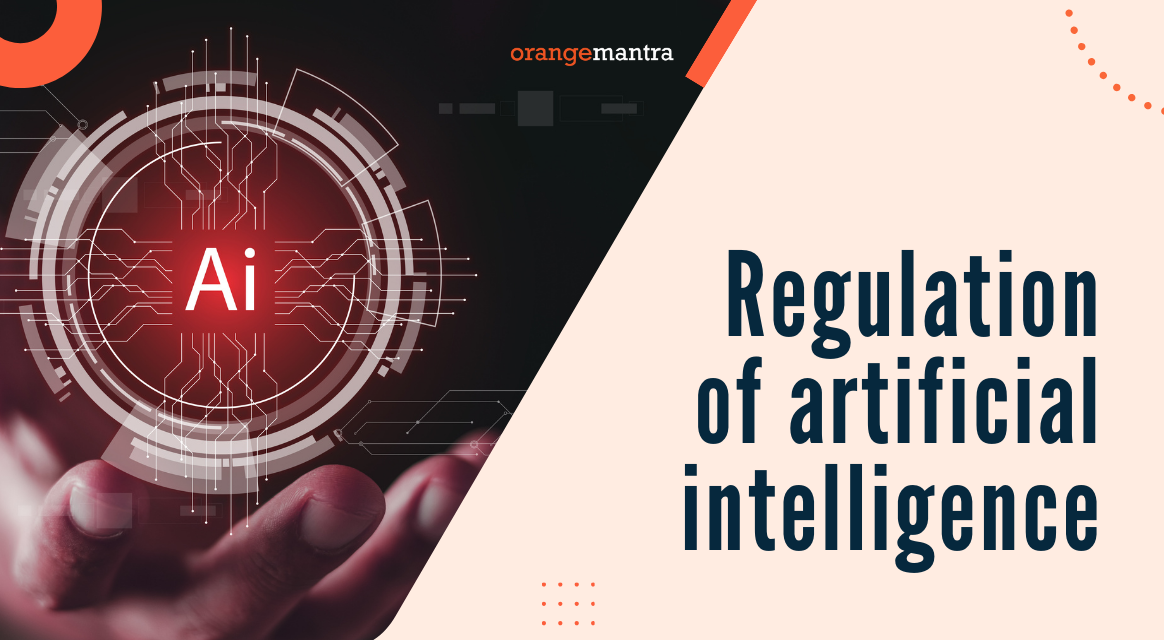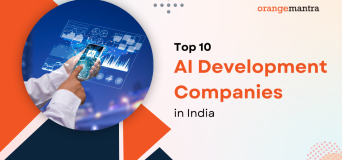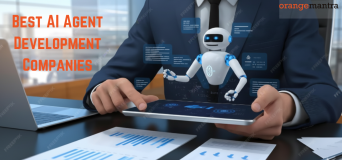
Here’s what you will learn:
Artificial intelligence (AI) is becoming a more important tool for businesses of all stripes to improve their competitiveness in the market and streamline their operations. But as AI technology develops quickly, worries about its possible hazards and moral ramifications grow. AI Regulations are thus imminent, intending to ensure that this potent technology is used responsibly.
This blog will examine the development of AI regulations, their benefits, conversational AI solutions, their features, how businesses can use them, the similarities and differences between AI and human intelligence, the influence of generative AI on business expansion, and, finally, the likely course of AI regulation.
Table of Contents
AI Evolution and Development in 2023- 2024
Various projections and predictions indicate that the years 2023–2024 will see a growth in the number of AI rules. Governments and oversight organizations are seeing the need to create thorough frameworks that handle the moral issues raised by AI. The objective of this legislation is to guarantee accountability, equity, and transparency in the use of AI systems in various businesses.
Top 5 Benefits of Regulations Regarding AI
AI laws are expected to benefit companies and society at large in several ways. Among them are:
1- Ethical Use of AI:
Policies will prioritize the responsible and moral use of AI, safeguarding people’s privacy and rights and prohibiting discriminatory actions.
2- Mitigating Bias:
To promote equity and equal chances, efforts will be taken to minimize biases that can result from the data used to train AI systems via the enforcement of legislation.
3- Increased Trust:
With rules in place, companies can gain the confidence of stakeholders, workers, and consumers by ensuring that AI technologies are used responsibly and accountable.
4- Enhanced Security:
Laws will handle the possible cybersecurity threats connected to AI systems, guaranteeing their strength, resiliency, and defense against malevolent actions.
5- Leveraging Global Standards:
AI legislation will work to ensure consistency and interoperability while promoting cooperation and innovation in the AI sector by harmonizing global standards and practices.
Top 5 Best Solutions for Conversational AI
NLP Solutions is the emphasis of conversational AI, an application of AI technology that provides a range of solutions that can improve customer interactions and expedite company procedures. These five conversational AI systems have the potential to completely transform business:
1- Virtual Assistants:
Businesses can boost customer satisfaction and operational efficiency by using AI-powered virtual assistants that can handle questions, give personalized customer assistance, and even help with transactions.
2- Chatbots:
Businesses can provide 24/7 customer service, automate monotonous operations, and instantly respond to client inquiries by using chatgpt integration that are outfitted with natural language processing capabilities. This leads to an improvement in the user experience.
3- Speech Recognition:
Hands-free user interactions are made possible by the integration of speech recognition technology into goods and services, which benefits customers and improves accessibility for people with disabilities.
4- Language Translation:
Conversational AI can help with real-time language translation, removing obstacles between speakers of various languages and facilitating smooth conversation.
5- Sentiment Analysis:
Businesses can use conversational AI to analyze and comprehend the sentiment conveyed in customer feedback. This allows them to immediately address issues and implement appropriate modifications.
Top 5 Characteristics of AI Control
To guarantee the appropriate implementation and utilization of AI systems, regulatory frameworks for AI will include a range of elements. There is a big question about how to regularize AI. Below are some of the ways we can do it
-
Data Privacy and Protection:
The main goals of the regulations are to provide people control over their information, protect it from unauthorized access, and ensure that it is handled securely.
-
Algorithmic Transparency:
Algorithmic systems will be made more transparent by implementing measures that make it possible for people to comprehend the reasoning and decision-making processes used by AI algorithms.
-
Explain ability and Accountability:
To encourage dependability and accountability, AI legislation will need companies to be able to justify the choices their AI systems make.
-
Human supervision:
Regulations will stress the necessity for human supervision in crucial decision-making processes to prevent an excessive dependence on AI and preserve human control.
-
Auditability and Compliance:
Rules will compel AI systems to be evaluated and monitored to make sure they follow the law and ethical guidelines.
Top 5 Ways to Apply AI Rules in the Workplace
Regulations about AI can benefit businesses in several ways. The following five tactics will help you maximize AI regulations:
-
Compliance and Risk Management:
Businesses can minimize legal risks and reputational harm by proactively adhering to AI legislation, ensuring that they conduct business within morally acceptable bounds.
-
Building Trust and Reputation:
Complying with rules fosters consumer trust and improves a business’s standing as one that values responsibility, fairness, and data privacy.
-
Ethical AI Development:
Businesses can design and implement AI systems that prioritize ethical concerns by following the framework provided by regulations, which will benefit the firm and its stakeholders.
-
Competitive Advantage:
Organizations that adopt ethical practices and AI rules differentiate themselves from rivals that cannot place as much emphasis on responsible AI usage.
-
Innovation and Collaboration:
AI rules encourage enterprises to work together and share information, which promotes the creation of best practices and propels innovation in the AI sector.
Artificial Intelligence vs Human Intelligence: Which is Better?
Even while artificial intelligence (AI) technology develops quickly, human intellect is still very useful. The following five characteristics set artificial intelligence apart from human intelligence:
-
Creative Problem-Solving:
While AI systems are excellent at analyzing vast volumes of data and seeing trends, ai or human intelligence is superior at coming up with original ideas, thinking creatively, and solving problems.
-
Emotional Intelligence:
AI systems now lack emotional intelligence, which allows humans to comprehend and react to the emotions of others, form relationships, and exhibit empathy.
-
Contextual comprehension:
While AI regulation systems depend on preset algorithms and can find it difficult to recognize subtle subtleties, human intelligence enables a nuanced comprehension of complicated situations by considering diverse contextual aspects.
-
Adaptability and Learning:
While AI systems need ongoing training and upgrades to acquire new capabilities, humans can learn and adapt in dynamic and changing settings. There are lots of Emerging tech companies that are using AI for the digital transformation and development of their business.
-
Morality and Ethics:
While AI Regulations are unable to make moral choices and can only optimize according to preset criteria, human intelligence allows people to take moral and ethical considerations into account when making decisions.
Top 3 Methods the Impact of Generative AI on Business Growth Is Significant
A fascinating development in AI technology called generative AI is having a big influence on corporate expansion. Here are three ways that generative AI is promoting success in the corporate world:
-
Content Creation and Personalization:
Generative AI can help with the creation of personalized and interesting content, such as product suggestions and customized marketing campaigns, which can boost conversion rates and consumer engagement.
-
Product and Service Innovation:
By using generative AI, companies can go into uncharted territories and provide creative product designs, formulas, or even whole new products and services that promote growth and competitiveness.
-
Process Optimization:
By streamlining intricate corporate procedures like resource allocation or supply chain management, generative AI algorithms can raise productivity, cut expenses, and improve overall performance.
-
Risk Management
Risk management is also important in AI we just need to develop a strategy from which we can mitigate the errors that can occur in the data structure. We can do it by applying some steps in the first step that can be found, and after that explanations. In these steps, research is required for the AI regulation. After that, we can develop the AI mitigation setup for risk management purposes. Risk management deployment takes place after that and by applying these steps we can rectify the error.
The development of AI can be seen in the different aspects of the development in the core process of automation and also in the development cycle. The main core reason for the Time being that can be used in the process is also can be seen in the being process.
Final Thoughts
Artificial intelligence (AI) rules are coming soon, and they will benefit society and companies in many ways by guaranteeing the ethical and responsible use of AI technology. Businesses can improve customer relations and expedite processes by using conversational AI technologies. AI regulatory frameworks and AI development companies will include a range of characteristics that encourage accountability, transparency, and human monitoring.
Companies can benefit from AI rules by adhering to moral standards, establishing credibility, obtaining a competitive edge, and encouraging creativity. While generative AI has a significant influence on corporate success via content creation, creativity, and process optimization, human intelligence is still distinct and priceless. A more morally driven, transparent, and reliable AI Impact in India’s environment that serves people, companies, and society at large is probably what will happen as AI laws continue to change.
FAQs
-
What is the significance of AI rules for businesses?
A framework for responsible AI deployment that guarantees accountability, ethical behavior, and data protection is provided by AI legislation. Adherence to rules facilitates the establishment of trust, risk mitigation, and legal maneuverability for enterprises using artificial intelligence technology.
-
What regulatory agencies are in charge of business AI?
Jurisdiction-specific regulatory supervision differs. Common organizations include the Federal Trade Commission (FTC) of the United States, the European Commission of the EU, and sector-specific regulators. Enterprises need to be up to date with relevant authorities within their operational areas.
-
What kinds of AI-related activities are usually subject to regulation?
Data security, algorithmic transparency, bias reduction, and ethical concerns are just a few of the topics that regulations often address. Regulations about AI development, deployment, and decision-making procedures should be known to businesses involved in these processes.
-
What effect does the regulation of AI have on data privacy?
Privacy protection clauses are often seen in AI rules. To ensure compliance with data privacy legislation, businesses must abide by data protection principles, gain user permission, and adopt procedures to preserve sensitive information.
-
Are AI employment procedures subject to any particular regulations?
To combat prejudice and discrimination, certain legal systems have begun to address AI in hiring. Regulations requiring openness in AI-powered recruiting choices might guarantee applicants’ equality of opportunity and fairness.
-
How can companies ensure they follow AI regulations?
Companies should prioritize openness, carry out frequent evaluations of the effects of AI, put ethical AI concepts into practice, and set up strong data governance procedures. Compliance requires keeping up with changing laws and working with legal professionals.


